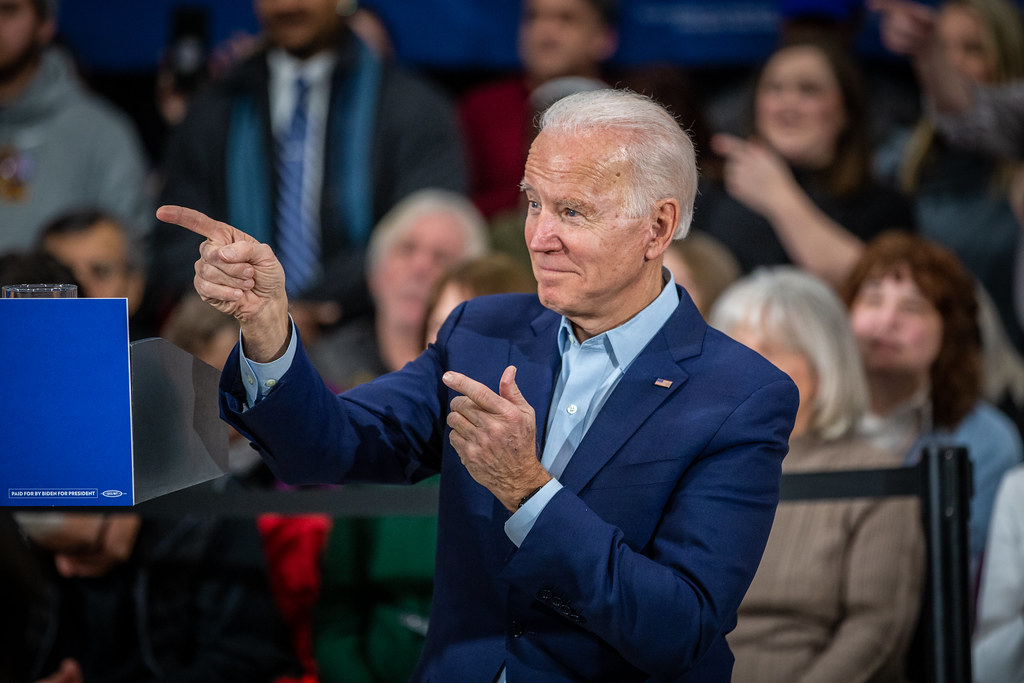Is Biden Trapped by Identity Politics?
As anticipation continues to build over Joe Biden’s choice of running mate, he’s announced that his preference is for a candidate of a different race and gender than himself and followed this up with a commitment to selecting a candidate of a different gender. This rankles many people, even some with otherwise liberal leanings. The thought, it seems to them, is that candidates for office should be selected entirely on the basis of their qualifications, without consideration of their sex or race. To think otherwise, now, has come to be pejoratively called “identity politics”, and as more Democrats push for Biden to choose a Black woman, right-wing voices delight in the insistence that Biden is being held hostage by identity politics. What’s so bad about that?
Identity politics is often treated as a term of abuse. This is not surprising, as the concept now so often stands for politicians using their racial or gender identity — or proximity to such — as a means to achieve political aims such as winning an election or silencing critics. New York Mayor Bill de Blasio, for example, has seemingly attempted to counter the growing number of criticisms from African-American former allies by increasing public appearances with his African-American wife, Chirlane McCray.
Such uses of identity politics appear cynically calculated to influence voters’ decisions not through sound argument or policy, but by appealing to a desire to support one’s group. In the worst-case scenario, identity politics in this sense is meant to deceive voters: it tells them that a candidate is one of them, or on their side, while endorsing policies that harm them. Identity politics can, of course, be abused in this way, in what Olúfẹmi O. Táíwò has called “elite capture”: the process by which a movement is exploited by elites to serve their own purposes rather than those of the people it is supposed to help. But abuse of this kind is not unique to identity politics, and so not a reason to dismiss it as harmful in itself.
It would be objectionable if Biden or those pressuring him were using identity politics in order to manipulate voters into acting in ways that harm them while helping Biden or his party. But for that to be the case, it would have to be true that he is actively pushing for policies that would harm the voters such a stratagem is designed to win over, and it’s unclear that he is — at least compared to his opponent. Moreover, for him to be using identity politics in this way, it would need to be the case that distracting voters from their real interests were his main reason for leaning toward a Black woman as a running mate. But there is no evidence of this, and it seems unlikely considering the chorus of his supporters pushing him to make this choice. It’s true, of course, that Biden is trying to win the election, and any running mate he chooses will be someone calculated to help him do that. But presumably he does a lot of things with that aim, most of them unobjectionable. If his purported reliance on identity politics is a problem, then, there must be a further reason.
One common objection to identity politics holds that voters have “been presented with a narrative and arguments convincing them to rely on identity politics, or in other words, shallow stereotypes,” as Tammy Bruce puts it. On this uncharitable view of identity politics, it functions primarily by reducing people to representatives of particular identities rather than recognizing them as individuals. Perhaps, then, the critics mean that in having to choose a Black woman candidate, Biden is ensuring that whoever he eventually chooses is not chosen for her qualifications, but for her gender and race alone. This is a popular take on identity politics, but it comes with its own set of problems.
First, to think that the pressure on Biden forces him to choose not a person but a stereotype seems to itself reduce Black women to stereotypes, since simply committing to a Black woman candidate does not imply either that anyone who meets that description is equally qualified nor that everyone who meets that description is qualified. The thought, instead, could be that although a number of Black women are perfectly qualified to be vice president, no one from that demographic has ever been chosen for the role due to a social depreciation of their race and sex. Seen in this light, a commitment to choosing a Black woman need not appear as a commitment to choosing a stereotype, but to choosing from a typically overlooked pool of excellent candidates.
Second, there is an underlying assumption that one’s sex or race is irrelevant to one’s qualification for a job. But clearly this is not always the case. It makes good sense, for example, to choose a Black spokesperson for the NAACP or a woman to consult women on reproductive issues. In these cases, a candidate’s race or sex is a qualification for the position, though it is not the only qualification and may not even be a necessary one. If, for example, a reproductive counselor is needed but no women with the requisite training can be found, it would make sense to choose a man. Still, to strongly prefer a woman for that position is not in itself problematic. There is no reason that the same might not be true of a candidate for vice president, especially if we consider that what qualifies one for that role is not some fixed set of laws, but an interplay of the historical and cultural context with the presidential candidate’s and their party’s strategy and priorities.
But there is an even more widespread, and perhaps slightly more highbrow criticism of identity politics, leveled by pundits from the liberal middle to the far right of the spectrum, such as Mark Lilla, Francis Fukuyama, Jonah Goldberg, and the Heritage Foundation. The spirit of this criticism isn’t so much that identity politics encourages us to see each other — and ourselves — as stereotypes. Instead, while such critics sometimes express sympathy for identity politics, they argue that by focusing on group identities it undermines the communal ties that bind us together. On this view, identity politics weakens our shared values by encouraging us to view ourselves primarily as members of sub-national groups and to focus on the interests of our group rather than those of the country. From this perspective, in expressing a preference for a running mate of a particular race and sex, Biden is sending a signal to some social groups that he is on their side but simultaneously telling other groups that he is not on theirs, and that he represents a fundamentally different culture from their own: one that prizes diversity over their interests.
But the view of identity politics as essentially divisive only works if we assume the divisions aren’t there to start with, or that they are minor enough that drawing attention to them causes more harm than good. If the divisions are already there, however, the options are to ignore them or to work to repair them, which cannot be done without recognizing that they exist. Now suppose that an electorate overwhelmingly votes for white men, regardless of the qualifications of others in the running. We might think that such an electorate is flawed. Waiting for the political landscape to improve on its own might work, but it also might not, since the electorate reproduces its biases with every election, choosing the person who “looks right” for the job, and thereby ensuring that that’s the kind of person who looks right for the job. In the meantime, an entire field of highly qualified candidates is left out. Another alternative, then, is to change the landscape by providing extra support for the candidates who don’t fit that type.
Identity politics — or at least the term itself — began life with the statement composed by the Combahee River Collective in 1977. The Black lesbian activists who comprised the collective did not take the concept to mean that they should get special treatment simply because they were Black, women, and lesbians. Instead, the thought was that insofar as society is structured in a way that does not treat all equally, they have a better insight into the inequalities that affect them than Black men, or straight women, might have. But the goal is not to splinter into ever-smaller groups, each demanding different treatment. The goal, rather, is for each group to lay out the ways in which it is not treated equally, so that different groups can come together in solidarity to help right each other’s injustices. Identity politics is the means; solidarity is the end. Elizabeth Drew asks, “But why does a woman necessarily merit a head start on the next presidential nomination?” The answer, perhaps, is that it’s time that women — and especially Black women — have the platform from which to present their own solutions to injustice.





